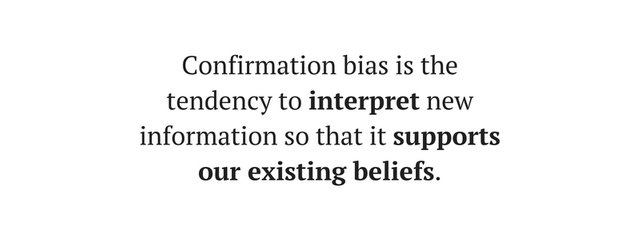
You've decided to invest your money in the stock market, and you've had your eye on a company for the past few days. You decide to buy the stock, confident it will bring you a tidy profit.
The first few weeks see the price rise and you feel proud, but the stock begins losing value. You tell yourself it's just market nerves, in spite of reports that the stock is overpriced.
Over the next few weeks the value drops more and you're losing money. Instead of cutting your losses, you stick with it insisting that it's a long term investment.
Congratulations! You've just fallen victim to the confirmation bias.

The life of Jane
Snyder and Cantor (1979) performed an experiment where participants were given an extensive account of events in one week of the life of a woman named Jane. Some events showed that Jane could be extrovert; others showed her to be introvert.
Two days later the participants were split into to groups and asked to consider Jane for the suitability of a job.
The first group were asked to consider Jane for the rather extroverted job of real estate sales person; the second for the job of the rather introvert job of research librarian.
When considering Jane for the position of real estate sales person, participants recalled the characteristics that showed Jane to be extrovert, ignoring those that showed her to be introvert. Likewise, when considering Jane for the position of research librarian, participants recalled the characteristics that showed Jane to be introvert, ignoring her extrovert characteristics.
Each group saw Jane as the person they were looking for, rather than as the person she was.
Cold reading
Confirmation bias shows up in a lot of places. It's common in business, where negative effects of a strategy are ignored because the stakeholders are invested in its success.
Psychics, astrologists, and other pseudo-sciences also rely heavily on the confirmation bias. You can see an excellent example of this in the cold-reading experiment by Derren Brown
He tells participants he will write a description of their personalities just by looking at a drawing of their hand and their date of birth. What the participants don't realise is that each of them will receive the same description.
The participants ignore the information in the description that doesn't confirm their beliefs about themselves, concentrating only on what does.
Religion
In many cases the confirmation bias is harmless; however, in some cases it can be life-threatening. Confirmation biases appear a lot in religion.
When water started trickling down a statue of Jesus Christ at a Catholic church in Mumbai in 2012, locals were quick to declare a miracle, even proclaiming it a site of holy water.
When Sanal Edamaruku established that it was in fact caused by a clogged drainage pipe, there was a backlash. He was accused of blastphemy, received death threats, and was forced to seek exile in Finland.
What can we do?
Is there anything you can do to combat the effects of the confirmation bias? Yes, but keep in mind that it's often an automatic, unintentional process and might not be easy to spot.
After you make a decision, consider whatever evidence you can find, even if it dis-confirms your decision. You might feel bad about the decision you made, but it will help you make a better decision the next time.
Banner photo by Robert Couse-Baker used under the CC-BY-2.0 license.
This is very similar to cognitive dissonance, which is essentially when someone has a rigid belief system or acceptance of a concept, but when presented with indisputable facts which counter that belief or concept, the person is confronted with an uncomfortable truth which they can't deny (that's the dissonance). However, they won't allow themselves to let go of that previously held belief so they will therefore morph that new information into something that fits it so that it continues to make sense to them. Basically the person will twist facts to make them fit their belief. We see this a lot when people do their best to marry science with religion, such as when someone studies science with the thought in the back of their mind of "How would God fit into this?" only to come up with a way in their mind for it to work, sometimes outlandishly.
Great post, you got me thinking. ;-)
Downvoting a post can decrease pending rewards and make it less visible. Common reasons:
Submit
Psychology, especially in the area of cognitive biases, have been of interest to me for a while. Thanks for sharing your thoughts. Would be interested to hear more in relation to other biases.
Another common one is the 'Gambler's fallacy, ' where a person mistakenly thinks the probability of a future event is altered by past events. E.x. Coin flipping and getting 'tails' 9 times might lead someone to mistakenly think there's a high probability that the next toss will be 'heads.' A series of coin tosses are independent events, with the probability of heads and tails being approximately 50%.
Speaking of biases, coins themselves exhibit biases due to thickness, center of gravity and the force applied to it (among other things). Apparently there's a 1/6000 chance the US nickel will land on it's SIDE. ;)
See 5:57 of this awesome video by VSauce:
Downvoting a post can decrease pending rewards and make it less visible. Common reasons:
Submit
Nice piece, Seen this affect every avenue in life. Hard to avoid being embedded in human nature, but great to be aware of
Downvoting a post can decrease pending rewards and make it less visible. Common reasons:
Submit
Thanks. Me too. I usually spot it in myself in hindsight. We are very good at convincing ourselves.
Downvoting a post can decrease pending rewards and make it less visible. Common reasons:
Submit
yep. hindsight cleve has a far better life than stumbling blind cleve... hate that guy
Downvoting a post can decrease pending rewards and make it less visible. Common reasons:
Submit
I'm the same with the hindsight being 20/20....but every now and again I'll catch myself in the moment and I'll just let thoughts leave my head and do a bit of meditation. Sometimes listening to a vinyl record can calm my mind from trying to tell 'the story' of my life.
Downvoting a post can decrease pending rewards and make it less visible. Common reasons:
Submit
Meditation sounds like a great way to cope with this. As you're hinting, even when you do become aware of it fighting it isn't easy.
Downvoting a post can decrease pending rewards and make it less visible. Common reasons:
Submit
I love the psychology of this. It applies to just about everything! While I was reading this I was reminded of how stubborn I can be on places like ebay or dealdash. I'm so confident that I'll win but in the end I've paid more than what the item was worth. It's why I don't gamble and WHY i stay away from those kinds of sites. LOL
Downvoting a post can decrease pending rewards and make it less visible. Common reasons:
Submit
Great example. There are a few big purchases I've made in my life that I justified falsely. I bought an e-reader when they were the hot new technology even though I seldom read. lol.
Downvoting a post can decrease pending rewards and make it less visible. Common reasons:
Submit
5 How to keep your body to stay healthy
https://steemit.com/life/@germa66/5-how-to-keep-your-body-to-stay-healthy
Downvoting a post can decrease pending rewards and make it less visible. Common reasons:
Submit
Nice @bitcalm
Shot you an Upvote :)
Downvoting a post can decrease pending rewards and make it less visible. Common reasons:
Submit